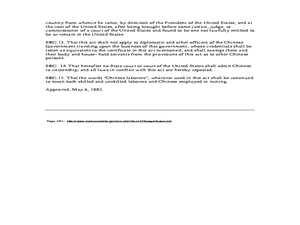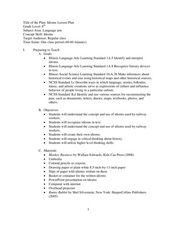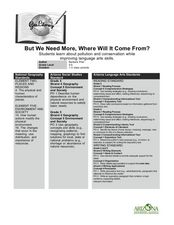Curated OER
In the News
Third graders participate in a instructional activity that helps to improve reading comprehension. They move through several activities that help them understand how to express their opinions, support their statements and communicate...
Curated OER
LETTER FROM ONE CHARACTER TO ANOTHER
Fourth graders read stories and pick one with characters they find interesting. Then students create a dialogue of writing a letter from one character to another. The letter must relate to the original story in some way that can easily...
Curated OER
Nursery Rhymes
Students recall details of nursery rhyme read by teacher, identify main characters, and demonstrate knowledge of poem by creating concept map about story that includes title, clip art, and changes in font and color.
Curated OER
Cause and Effect
Students identify cause and effect relationships in a short story. After reading a short story, they participate in a discussion of how one event in a story can lead to several others. Students are then paired for a matching task that...
Curated OER
Personality Types and the Individual
Seniors explore their personalities through a test. They read information about their personality type, summarize it, and locate a quote using Internet resources. They conduct research to locate a picture representing ten individual...
Curated OER
Fossil Fuels and Its Effects On The World
Students explore the effects of a declining fossil fuel system would have on the world. They read the line graph and other information to answer questions about fossil fuels. Students use mathematics to analyze graphical data and...
Curated OER
Roles of the President
Students read a document which explains the roles and responsibilities of the President of the United States. In groups, they tour the George Bush Presidential Museum and participate in a Presidential scavenger hunt. Once back in the...
Curated OER
America 2000: Federal Round Table Discussion
Eighth graders examine the United States Constitution and identify the beliefs and values Americans follow today. In groups, they compare and contrast state's rights and federal rights and the issues affecting them. They debate the...
Curated OER
Literature-based Skill Building:Holesby Louis Sachar
For this literary elements worksheet, learners read chapters 26, 27, and 28 of Holes by Louis Sachar and then respond to 13 short answer questions regarding setting, conflict, and inference.
Curated OER
Seasons
Students name the 4 seasons, discussing the weather, plant life, animal life and and activities of each. Students read the book titled, "Hello Arctic," and and discuss changes in seasons that accompany the story. Students complete...
Curated OER
Reviewing Literary Elements
Students identify the elements of fiction, and work on compare and contrast skills.. In this comprehension instructional activity, students read different versions of Cinderella. Students use a Venn diagram to compare and contrast the...
Curated OER
Visual Learning: Gone Fishing
Students complete visual learning activities using a photograph of a fisherman. In this photograph analysis lesson, students analyze the photograph and the facts within the picture. Students read a quote and caption for the photograph...
Pennsylvania Department of Education
Using Literary Elements to Compare Fiction Texts
Students explore language arts by reading and reflecting on literary examples. In this fiction writing instructional activity, students read several different cultural versions of the story "Cinderella" and discuss their interaction with...
Curated OER
Bearly Any Ice
Students participate in a prey-predator game. After reading background information, they discover the impact from the changes global warming presents to the polar bears and ringed seals. They role play the role of either the seal or...
Curated OER
Radioactive Decay: A Sweet Simulation of a Half-life
High schoolers demonstrate rates of decay of unstable nuclei can be measured. They understand ratios and multiplication of fractions. They simulate radioactive decay. They read about the accomplishments of scientists.
Curated OER
Which Colored Filter Will Decode a Secret Message?
Students investigate how to create secrete messages through filters. They view pictures with red and green filters and discuss what they observe. They select the color filter that works best to read secret messages. They view pictures...
Curated OER
Are You Thirsty? The Effects of Pollution on Drinking Water
Discuss the availability of clean, plentiful water and the causes of water pollution. In groups, sixth graders discuss problem-solving methods for keeping water clean. They explore the function of water treatment plants and perform...
Curated OER
Thanksgiving Mourning
Students examine the way diverse groups can perceive a shared experience in a dramatically different light. Students read commentary written by Native American writers and find examples of different points of view. Students...
Curated OER
Weather Observation Journal
Young scholars research weather patterns. In this weather lesson, students read Chester Noongwook's Rules of Weather Observation and keep a weather journal for one month. Young scholars observe the weather patterns throughout the month.
Curated OER
Immigration and the Chinese Exclusion Act of 1882
Eleventh graders explore the effects of the Chinese Exclusion Act of 1882. In this immigration lesson, 11th graders consider the impact of Chinese immigration to America as they read and discuss writings on the topic from noteworthy...
Curated OER
Idioms Lesson Plan
Sixth graders discover idioms. In this idioms lesson, 6th graders evaluate idioms and discover their meaning. Students read Runny Babbit by Shel Silverstein and create unique idioms. Assessment rubric is provided.
Albert Shanker Institute
Economic Causes of the March on Washington
Money can't buy happiness, but it can put food on the table and pay the bills. The first of a five-lesson unit teaches pupils about the unemployment rate in 1963 and its relationship with the March on Washington. They learn how to create...
Curated OER
Cattle Drive
Students explore cattle drives. In this United States history and letter writing lesson, students write a letter to their family predicting possible problems that were encountered by participants in cattle drives. Students design brands,...
Curated OER
But We Need More, Where Will It Come From?
Young scholars write a persuasive letter and create a poster about pollution and conservation. In this pollution and conservation lesson plan, students learn how humans are the number 1 cause of pollution.
Other popular searches
- Making Inferences in Reading
- Making Inferences Reading
- Inferences in Reading
- Reading Inferences 4th Grade
- Reading Inferences 6th Grade
- Reading Inferences Poetry
- 1st Grade Reading Inferences
- Draw Inferences in Reading
- Reading Inferences Handouts
- Guided Reading Inferences
- Shared Reading Inferences
- Make Inferences Reading

























